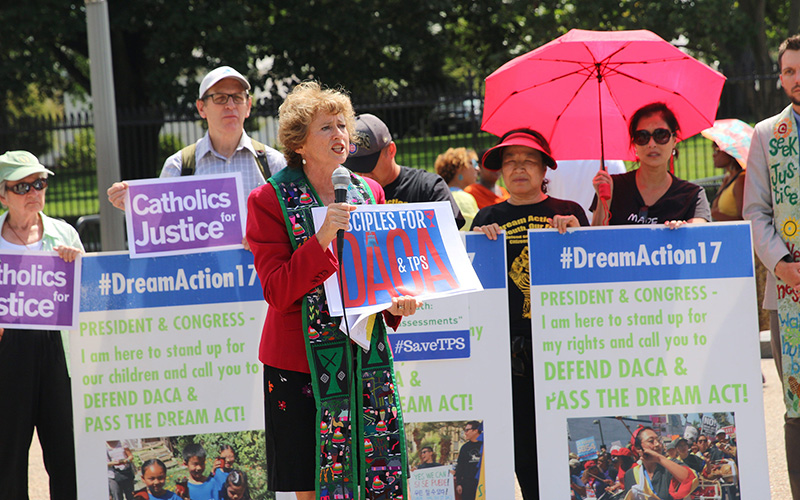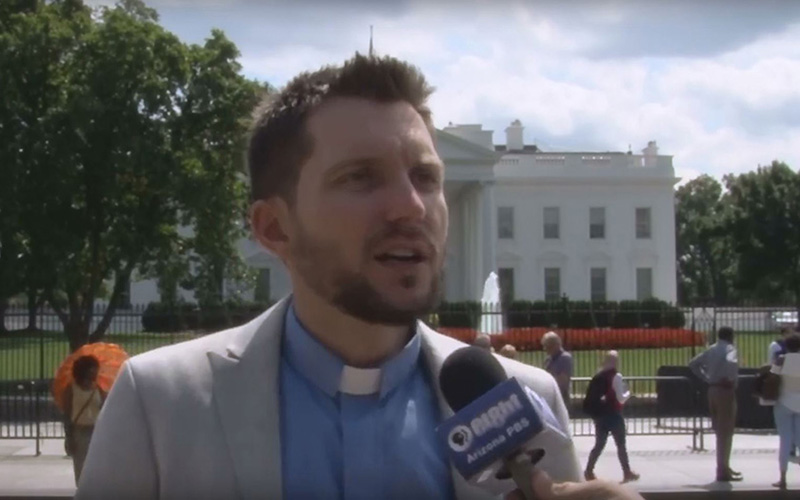
The Rev. Sharon Stanley-Rea exhorts protesters outside the White House who are urging President Donald Trump to preserve the Deferred Action for Childhood Arrivals, or DACA, program. Trump is expected to announce this weekend whether he will revoke the program. (Photo by Andrew Nicla/Cronkite News)

Arizona minister Noel Andersen joined faith leaders at the White House where they vowed a fast while the president considers whether to revoke the DACA program. Andersen said losing DACA would “create tremendous damage” to immigrants and their families. (Photo by Fraser Allan Best/Cronkite News)
WASHINGTON – Arizona minister Noel Andersen joined dozens of faith leaders outside the White House where they vowed Wednesday to mount a fast over the next week as the fate of a deferred deportation program for minors hangs in the balance.
Andersen and the others said they hope their fast will convince President Donald Trump to keep the DACA program and protect the estimated 750,000 “vulnerable” immigrants who now call the United States their home.
Their plea comes as a group of 10 state attorneys general, led by Texas Attorney General Ken Paxton, are telling Trump they will sue the administration to block DACA if the president does not void it by Tuesday.
The seven-day fast by representatives of several Christian denominations and immigration advocacy groups who gathered in Lafayette Square is timed to coincide with Paxton’s deadline.
See related stories:
“If the president takes (DACA) away, it’s going to create tremendous damage both psychologically and just the reality of a thousand people per month being put into the deportation pipeline and separating families,” Andersen said. “We are here today to urge the president and Congress to protect DACA now.”
The advocates said that if Trump is the “man of faith” he claims to be, he will not kill the Obama-era DACA program, which defers deportation for illegal immigrants who were brought to this country as children and gives them the right to drive and work, among other benefits.
Andersen, an immigrant rights organizer for the Church World Service, said many of the people who would be affected by a repeal of DACA are members of Arizona communities and congregations.
The Rev. Sharon Stanley-Rea, director of refugee and immigration ministries at Indiana-based Disciples Home Missions, said the group also hopes to see Congress pass the DREAM Act, a bill that grant temporary residency to undocumented minors with the possibility of permanent residency. Versions of that bill are pending in the House and Senate.
Stanley-Rea, one of the main organizers of Wednesday’s event, said she wishes the president would ditch what she calls an “us vs. them” mentality and instead embrace the “us” in the debate, and welcome immigrants she said are vulnerable.
-Cronkite News video by Fraser Allan Best
“If the president takes DACA, then we will continue to stand up forcefully and we will express our displeasure and we concurrently continue to work for the passage of the DREAM Act in Congress,” she said. “If President Trump ends DACA before the DREAM Act is passed, those … in the program will be even more vulnerable.”
DACA, enacted in 2012, protects those who were under age 16 when they were brought to the United States illegally, essentially removing them from deportation priority and giving them the chance to work, earn an education and contribute to the communities they call home.
Immigrants have to apply for the program and are thoroughly vetted before getting DACA protection, and they must maintain a clean record to remain in the program. The deferral lasts for three years but can be renewed.
Repealing DACA would mean those immigrants would suddenly be subject to deportation. While Trump campaigned on a pledge to crack down on illegal immigration, he has been quoted in news reports recently as saying the decision on DACA is “very, very hard” to make.
Instead of a repeal, Andersen said he thinks DACA should be expanded because “it works.” He said he has seen polls that indicate a majority of Americans, including Trump voters, support the program.
At the least, he said, DACA must remain in place until the legislative branch crafts a permanent bipartisan solution that establishes a more efficient pathway to citizenship for undocumented immigrants. He is hopeful that can happen.
“We are seeing some Republican congresspeople come over and say we need to keep DACA in place until there’s some sort of permanent legislation,” Andersen said.